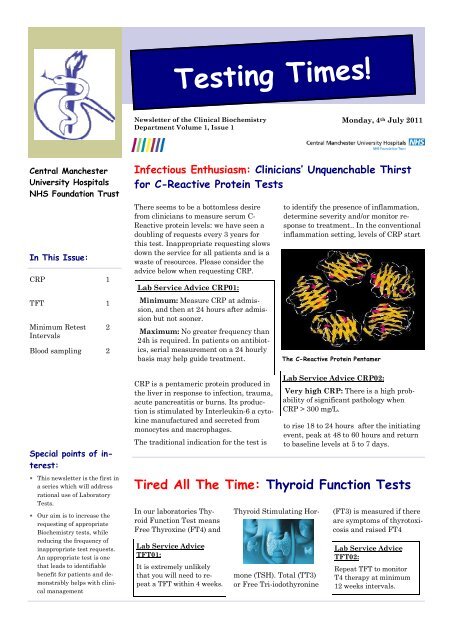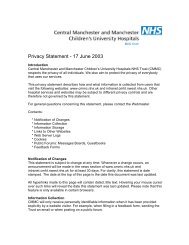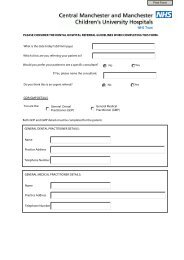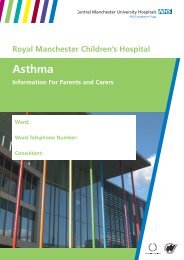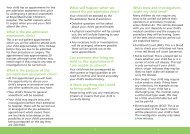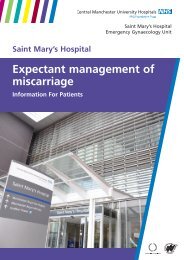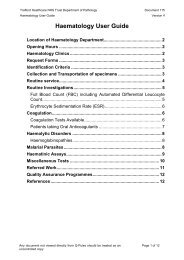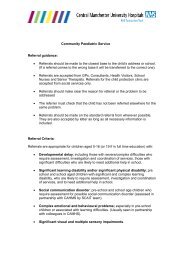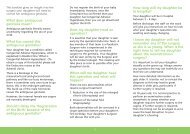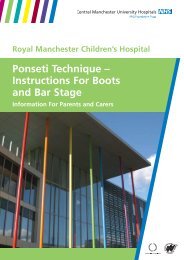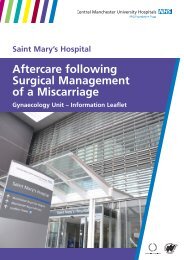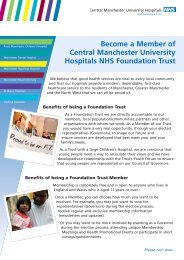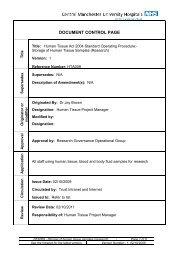Testing Times! - Central Manchester University Hospitals - NHS ...
Testing Times! - Central Manchester University Hospitals - NHS ...
Testing Times! - Central Manchester University Hospitals - NHS ...
Create successful ePaper yourself
Turn your PDF publications into a flip-book with our unique Google optimized e-Paper software.
<strong>Testing</strong> <strong>Times</strong>!<br />
Newsletter of the Clinical Biochemistry<br />
Department Volume 1, Issue 1<br />
Monday, 4 th July 2011<br />
<strong>Central</strong> <strong>Manchester</strong><br />
<strong>University</strong> <strong>Hospitals</strong><br />
<strong>NHS</strong> Foundation Trust<br />
In This Issue:<br />
CRP 1<br />
TFT 1<br />
Minimum Retest<br />
Intervals<br />
Special points of interest:<br />
This newsletter is the first in<br />
a series which will address<br />
rational use of Laboratory<br />
Tests.<br />
Our aim is to increase the<br />
requesting of appropriate<br />
Biochemistry tests, while<br />
reducing the frequency of<br />
inappropriate test requests.<br />
An appropriate test is one<br />
that leads to identifiable<br />
benefit for patients and demonstrably<br />
helps with clinical<br />
management<br />
2<br />
Blood sampling 2<br />
Infectious Enthusiasm: Clinicians’ Unquenchable Thirst<br />
for C-Reactive Protein Tests<br />
There seems to be a bottomless desire<br />
from clinicians to measure serum C-<br />
Reactive protein levels: we have seen a<br />
doubling of requests every 3 years for<br />
this test. Inappropriate requesting slows<br />
down the service for all patients and is a<br />
waste of resources. Please consider the<br />
advice below when requesting CRP.<br />
Lab Service Advice CRP01:<br />
Minimum: Measure CRP at admission,<br />
and then at 24 hours after admission<br />
but not sooner.<br />
Maximum: No greater frequency than<br />
24h is required. In patients on antibiotics,<br />
serial measurement on a 24 hourly<br />
basis may help guide treatment.<br />
CRP is a pentameric protein produced in<br />
the liver in response to infection, trauma,<br />
acute pancreatitis or burns. Its production<br />
is stimulated by Interleukin-6 a cytokine<br />
manufactured and secreted from<br />
monocytes and macrophages.<br />
The traditional indication for the test is<br />
to identify the presence of inflammation,<br />
determine severity and/or monitor response<br />
to treatment.. In the conventional<br />
inflammation setting, levels of CRP start<br />
to rise 18 to 24 hours after the initiating<br />
event, peak at 48 to 60 hours and return<br />
to baseline levels at 5 to 7 days.<br />
Tired All The Time: Thyroid Function Tests<br />
In our laboratories Thyroid<br />
Function Test means<br />
Free Thyroxine (FT4) and<br />
Lab Service Advice<br />
TFT01:<br />
It is extremely unlikely<br />
that you will need to repeat<br />
a TFT within 4 weeks.<br />
Thyroid Stimulating Hormone<br />
(TSH). Total (TT3)<br />
or Free Tri-iodothyronine<br />
The C-Reactive Protein Pentamer<br />
Lab Service Advice CRP02:<br />
Very high CRP: There is a high probability<br />
of significant pathology when<br />
CRP > 300 mg/L.<br />
(FT3) is measured if there<br />
are symptoms of thyrotoxicosis<br />
and raised FT4<br />
Lab Service Advice<br />
TFT02:<br />
Repeat TFT to monitor<br />
T4 therapy at minimum<br />
12 weeks intervals.
If you want blood, you got it!: We take too much blood from patients and<br />
we do it too often!<br />
Whenever we ask patients<br />
about their hospital experience,<br />
they make it clear to us<br />
that laboratory tests are<br />
their least favourite part of<br />
the experience. This is especially<br />
the case in children,<br />
and needle-phobia caused by<br />
repeated drawing of blood for<br />
laboratory tests is a major<br />
cause of anxiety and unhappiness.<br />
on management. If the answer is ‘no’ then don’t do the test!<br />
The right sample from the right patient at the right time.<br />
Lab Service Advice PHLEB02:<br />
When: When is the specific time it’s necessary to draw<br />
blood for this test (e.g. 9am Cortisol)?<br />
Why: Why perform the test? Is it for diagnosis, therapy<br />
monitoring, prognosis or screening?<br />
Every time we decide to do a blood test, we should carefully<br />
consider whether the test is really needed and in<br />
particular whether the result is likely to have an impact<br />
Lab Service Advice PHLEB01:<br />
How: How will a ‘positive’ change my patient’s management?<br />
How will a ‘negative’ result change my patient’s<br />
management? How will I use the result to<br />
change my patient’s management plan?<br />
What: What is the best test or tests? What is the<br />
minimum volume of blood I need? What other tests can<br />
I do on the same blood draw?<br />
http://www.cmft.nhs.uk/<br />
directorates/<br />
deptlabmed/indexaz.asp<br />
Please Sir, I Want Some More!<br />
Below is the current consensus<br />
for Minimum Retest Intervals for<br />
Common Biochemistry Tests:<br />
All tests can be measured at<br />
greater frequency than indicated,<br />
after discussion with one<br />
of the Consultant Biochemists.<br />
Test<br />
Minimum Retest Interval<br />
CRP<br />
24h<br />
eGFR<br />
4 weeks<br />
Iron<br />
4 weeks<br />
Ferritin<br />
4 weeks<br />
HbA1c<br />
2 months<br />
hCG pregnancy 2 days<br />
Liver Function Tests 48 h<br />
Lipids<br />
4 weeks<br />
Thyroid Function<br />
Tests<br />
4 to 10 weeks<br />
Troponin T 4 days<br />
Department of Clinical<br />
Biochemistry<br />
Clinical Sciences Building 3<br />
<strong>Manchester</strong> Royal Infirmary<br />
Oxford Road<br />
<strong>Manchester</strong> M13 9WL<br />
0161 901 5087


